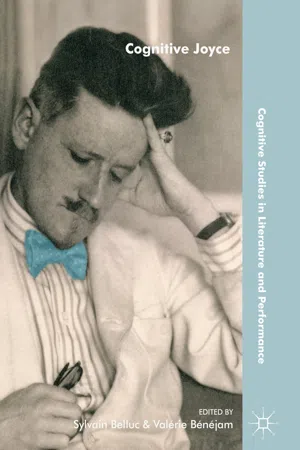
- English
- ePUB (mobile friendly)
- Available on iOS & Android
Cognitive Joyce
About this book
This collection is the first book-length study to re-evaluate all of James Joyce's major fictional works through the lens of cognitive studies. Cognitive Joyce presents Joyce's relationship to the scientific knowledge and practices of his time and examines his texts in light of contemporary developments in cognitive and neuro-sciences. The chapters pursue a threefold investigation—into the author's "extended mind" at work, into his characters' complex and at times pathological perceptive and mental processes, and into the elaborate responses the work elicits as we perform the act of reading. This volume not only offers comprehensive overviews of the oeuvre, but also detailed close-readings that unveil the linguistic focus of Joyce's drama of cognition.
Tools to learn more effectively

Saving Books

Keyword Search

Annotating Text

Listen to it instead
Information
Bibliography
- Aleman, André. On Redefining Hallucination. American Journal of Orthopsychiatry 68, no. 4 (1998): 656–8.
- Aleman, André, and Frank Laroi. Hallucinations: The Science of Idiosyncratic Perception . Washington, DC: American Psychological Association, 2008.
- Allen, Richard. Projecting Illusion: Film Spectatorship and the Impression of Reality . Cambridge Studies in Film. Cambridge: Cambridge University Press, 1995.
- ———. Looking at Motion Pictures. In Film Theory and Philosophy , ed. Richard Allen and Murray Smith, 76–94. Oxford: Clarendon Press, 1999.
- ———. Cognitive Film Theory. In Wittgenstein, Theory and the Arts , ed. Richard Allen and Malcolm Turvey, 177–211. London: Routledge, 2001.
- Aristotle. Posterior Analytics . Trans. E.S. Fouchier. Oxford: Blackwell, 1901.
- ———. The Parva Naturalia . Trans. J.L. Beare. 1908. The Works of Aristotle , III, 436a–486b. Oxford: Clarendon, 1931.
- Atherton, James. The Books at the Wake: A Study of Literary Allusions in James Joyce’s Finnegans Wake. Carbondale: Southern Illinois University Press, 1974.
- Attridge, Derek. The Postmodernity of Joyce: Chance, Coincidence and the Reader. In Joyce Effects , ed. Derek Attridge, 117–25. Cambridge: Cambridge University Press, 2000.
- Augustine. The Confessions of Saint Augustine. Minneapolis: Filiquarian Publishing LLC, 2008.
- Avenanti, Alessio, et al. Transcranial Magnetic Stimulation Highlights the Sensorimotor Side of Empathy for Pain. Nature Neuroscience 8 (2005): 955–60.
- Aziz-Zadeh, Lisa, et al. Congruent Embodied Representations for Visually Presented Actions and Linguistic Phrases Describing Actions. Current Biology 16 (2006): 1818–23.
- Ball, Sir Robert. The Story of the Heavens . London, Paris, and Melbourne: Cassell, 1892.
- Banfield, Ann. Unspeakable Sentences: Narration and Representation in the Language of Fiction . Boston: Routledge and Kegan Paul, 1982.
- Barash, David P., and Nanelle R. Barash. Madame Bovary’s Ovaries: A Darwinian Look at Literature . New York: Delacourt Press, 2005.
- Barsalou, Lawrence. Grounded Cognition. Annual Review of Psychology 59 (2008): 617–45.
- Barthes, Roland. S/Z . Trans. Richard Miller. Pref. Richard Howard. New York: Hill and Wang, 1974.
- Beckett, Samuel. Dante… Bruno. Vico.. Joyce. In Our Exagmination Round His Factification for Incamination of Work in Progress , ed. Samuel Beckett et al., 1–22. London: Faber, 1929.
- ———. Watt (1953). New York: Grove Press, 1959.
- ———. Three Novels: Molloy, Malone Dies, The Unnameable . New York: Grove Press, 2009.
- Beckman, Richard. Joyce’s Rare View: The Nature of Things in Finnegans Wake . Gainesville: University Press of Florida, 2007.
- Beja, Morris. Epiphany in the Modern Novel . London: Peter Owen, 1971.
- Bénéjam, Valérie. The Re-processing of Trash in Ulysses : Re-cycling and Post-Creation. Hypermedia Joyce Studies 5, no. 1 (2004).
- Benjamin, Walter. The Arcades Project . Ed. Rolf Tiedemann. Trans. Howard Eiland and Kevin McLaughlin. New York: Belknap Press, 2002.
- Bennett, M.R., and P.M.S. Hacker. History of Cognitive Neuroscience . Chichester: Wiley-Blackwell, 2008.
- Benoist, Jocelyn. Critique du donné. Archives de Philosophie 73 (2010): 9–27.
- Berkun, Scott. The Myths of Innovation . Sebastopol: O’Reilly Media, 2010.
- Bersani, Leo. Against Ulysses (1988). In James Joyce’s “Ulysses”: A Casebook , ed. Derek Attridge, 201–30. Oxford: Oxford University Press, 2004.
- Berthoz, Alain. Psychologie du changement de point de vue. In L’empathie , ed. Alain Berthoz and Gerard Jorland, 251–75. Paris: Odile Jacob, 2004.
- Bishop, John. Joyce’s Book of the Dark: Finnegans Wake . Madison: University of Wisconsin Press, 1986.
- Bizup, Joseph M., and Eugene R. Kintgen. The Cognitive Paradigm in Literary Studies. College English 55 (1993): 841–57.
- Blackburn, Simon. The Oxford Dictionary of Philosophy . 2nd ed. rev. Oxford: Oxford Uni...
Table of contents
- Cover
- Front Matter
- Introduction
- Knowledge and Identity in Joyce
- Intentionality and Epiphany: Husserl, Joyce, and the Problem of Access
- Authors’ Libraries and the Extended Mind: The Case of Joyce’s Books
- Characters’ Lapses and Language’s Past: Etymology as Cognitive Tool in Joyce’s Fiction
- Joyce and Hypnagogia
- Spatialized Thought: Waiting as Cognitive State in Dubliners
- The Invention of Dublin as “Naissance de la Clinique”: Cognition and Pathology in Dubliners
- Cognition as Drama: Stephen Dedalus’s Mental Workshop in A Portrait of the Artist as a Young Man
- Joycean Text/Empathic Reader: A Modest Contribution to Literary Neuroaesthetics
- Configuring Cognitive Architecture: Mind-Reading and Meta-Representations in Ulysses
- Hallucination and the Text: “Circe” Between Narrative, Epistemology, and Neurosciences
- “[The] Buzz in His Braintree, the Tic of His Conscience”: Consciousness, Language and the Brain in Finnegans Wake
- Back Matter
Frequently asked questions
- Essential is ideal for learners and professionals who enjoy exploring a wide range of subjects. Access the Essential Library with 800,000+ trusted titles and best-sellers across business, personal growth, and the humanities. Includes unlimited reading time and Standard Read Aloud voice.
- Complete: Perfect for advanced learners and researchers needing full, unrestricted access. Unlock 1.4M+ books across hundreds of subjects, including academic and specialized titles. The Complete Plan also includes advanced features like Premium Read Aloud and Research Assistant.
Please note we cannot support devices running on iOS 13 and Android 7 or earlier. Learn more about using the app